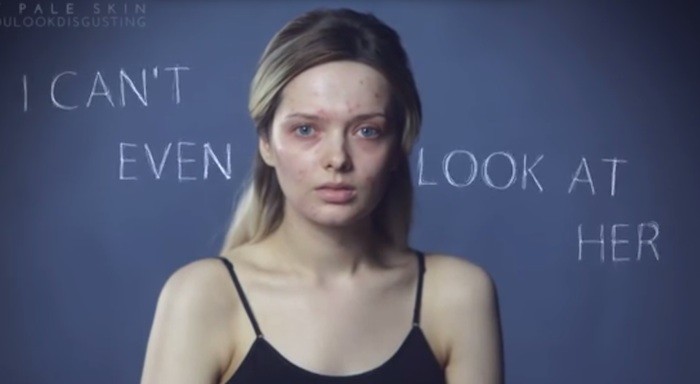I came across this video of Em Ford, a London beauty blogger who runs her own YouTube channel My Pale Skin.
Ms. Ford suffers from acne. She was bombarded with hateful comments whether she was wearing make-up or not, after posting a tutorial on how to conceal blemishes. It seems that her honesty and desire to promote her “you are beautiful no matter what” message brought out the worst in viewers.
Ms. Ford created this film to show how social media can set unrealistic expectations on our looks and encourages us to join the discussion on her blog using the hashtag #YOULOOKDISGUSTING.
Em created the video to shame haters—she says this:
“One challenge that many face today is that as a society, we’re so used to seeing false images of perfection, and comparing ourselves to unrealistic beauty standards that it can be hard to remember the most important thing: you are beautiful.”
Not all the comments were derogatory, but those that were brought her to tears and motivated her to challenge society’s view of what beauty is and is not.
Undoubtedly, Em Ford was brave to reveal herself wiped clean of make-up. For a woman who is expert at creating the perfect look, it was a step towards authenticity and a clear decision to help others overcome their image concerns.
For those of us who do not struggle with an easily visible skin condition, it is hardly easy to imagine what damage it does to the self-esteem. We leave the house each day face first, after all, and we are judged on a first-glance basis.
I surmise that unless we are ourselves going through the situation we would be hard pressed to understand all the implications of it. Like any other human struggle, self-esteem issues due to our appearance are serious and deserve respectful consideration and support.
After watching the video I asked myself these questions:
What part of society deems hateful remarks as appropriate human behavior?
Commentary does not always need to favor one side of a conversation. To expect everyone to agree on any one thing is unrealistic. I don’t always agree that if you have nothing nice to say you should say nothing at all…in the sense that sometimes we might voice an opinion that is strong or be construed as not positive simply because it is in disagreement with someone.
But hateful commentary, insensitive jabbing, cruel viewpoints are something altogether different.
From behind the privacy of our computer screen, we are able to be hateful without a face to face confrontation. Such freedom! We have never before, in any age, been so enabled by technology to bring harm with words.
An incredible amount of time is laid waste by those who engage these types of negative conversations.
Should we consider such attacks through social media as worthy of our attention or leave them at the feet of the depravity that hurled them?
While it is all fine and good for me to philosophize about how we should just not pay attention to personal attacks over social media, I must remember my own reactions to negative remarks when posted about something I’ve written. It is not easy to neither ignore, nor not absorb some of what we read. Yes, there must a measure of restraint from reading every comment and at some point we protect ourselves by shutting our computers down. We might know intellectually that what is being said is not worthy of our consideration, but emotionally we still struggle.
Some part of us wants to know, to connect with the community at large, to defend ourselves, to rise above the comments.
In the end, we all decide for ourselves when enough is enough and that the owner of the hurtful words simply is not interested in conversation but in being offensive.
How can we protect ourselves emotionally when we find ourselves in such a storm due to our march towards authenticity?
I think that awareness of all possible reactions is a start. We know that when we decide to be real, others will react out of their own insecurities and fears. A boundary for how much we can take in comes next.
For me, when I face unsavory commentary, it is a decision to deal with what is real conversation and set aside what is thoughtless verbiage. I’m not saying it’s easy, but necessary for self preservation.
Em Ford’s decision to use the negativity for social awareness is something I can truly applaud.
I spoke to a friend who could relate to deep-seated skin issues and she suggested to me that her regime of oil-cleansing her face, a re-vamp of her diet (she pared down to vegetables and slowly added in other food items to watch for reactions) and attention to her adrenal glands/endocrine system brought her into balance. (Check out the articles below for more info on natural skin care.)
I would love to hear your comments and ideas, and if so moved, please send Ms. Ford a show of support.
Relephant:
Ayurveda’s Top 10 Tips for Healthy Skin.
How I Cured my Adult Acne. (Naturally!)
Oil Cleansing: How to Have Amazingly Clear & Radiant Skin.
Bonus Video:
Author: Monika Carless
Editor: Renée Picard
Image: Screenshot from Youtube video



Read 0 comments and reply